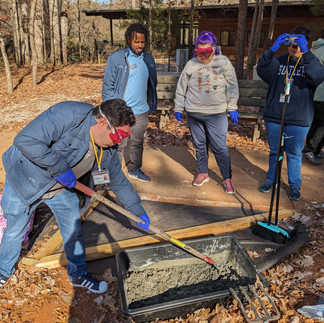Celebrating 2023’s EENC Mini-Grant Awardees
- Dec 8, 2023
- 5 min read
Each year, EENC awards mini-grants of $50-$250 to support members’ environmental education efforts. This year’s six awardees used this funding to pursue professional development experiences, implement new projects, purchase important supplies, deliver innovative environmental education lessons, and more! Together, EENC’s 2023 Mini-Grant Awardees reached over 4,000 learners in all four EENC Regional Sections through their mini-grant-supported efforts – learn about their incredible projects and impact below.
Awardee: Professional Member Desirae Clodfelter, Winston-Salem-Forsyth County Schools
Project Impact Area: Forsyth County, NC (EENC Piedmont Section)
Project: "One Man's Trash is Another Worm's Treasure”
My mini project aimed to teach students about the importance of consumption choices and how to reduce landfill waste. We have an incredibly designed worm bin students put together from Urban Worm Farm made from recycled plastic bottles. Students were very excited about the addition of red wriggler composting worms and cherished the opportunity to get their hands dirty as they learned the basics of vermicomposting.Over 110 8th grade students and 105 6th grade students have learned about the bin and how to use it as a tool to reduce landfill waste. They have so many options for "waste" before they even consider landfill options and the castings produced also fertilize our student garden that benefits local food banks. This project would not have been possible without your support and my students and I are very grateful.
Awardee: Professional Member Jennie Emmons, Excelsior Classical Academy
Project Impact Area: Durham, NC (EENC Central Section)
Project: STEAM in the Park Professional Development Experience
With help from the EENC Mini Grant, I was able to attend STEAM in the Park at Acadia National Park with my son over the summer. While there, we built our personal relationship as well as relationships with other families as we explored this beautiful place. We explored tide pools looking for life in the pools such as blue crabs, periwinkles, hermit crabs and dog whelks (also known as a “pickled wrinkle”). We learned about how the non-native green crab population has increased substantially due to climate change. We had the opportunity to meet the local wildlife in the camp such as porcupines, porcupettes, foxes and kits. We had many opportunities to practice nature journaling and making observations.When we started back to school, my son and I both shared what we learned about the green crab and how it is wreaking havoc in the tidepools of Maine. My students also completed a biome project that included a section on how their biome has been affected by non-native/invasive species. This experience was a once in a lifetime experience and I am grateful for EENC’s support for my summer adventure!
Awardee: Ally Organizational Member Kayla M McCoy, Wilkes County Soil and Water Conservation District
Awardee Location: Wilkes County, NC (EENC Western Section)
Project: Vermicomposting in the Classroom
The EENC Mini Grant was used to teach students about vermicomposting and provide 2 classrooms with a vermicomposting bin of their own! Vermicomposting is the use of worms to convert organic waste into a rich compost or fertilizer that can be used to help grow plants. Approximately 619 5th Grade Students in Wilkes County attended this year's 5th Grade Fall Field Days and learned about vermicomposting as well as, soil, wildlife, and forestry! Students loved being able to hold the worms and learn about what they like to eat and how they help cycle nutrients. The students are so excited to manage their own classroom worm bin!
Awardee: Professional Member Allison Murphy, Town of Garner/White Deer Park
Project Impact Area: Garner, NC (EENC Central Section)
Project: Barefoot Sensory Pathway
Thanks to the EENC Mini-Grant, visitors now have another wonderful sensory option to explore at White Deer Park. The new “Barefoot Sensory Pathway” is an area of the park that visitors can enjoy through their sense of touch. There are multiple sections of the pathway, each filled with natural materials of different textures, like smooth stones, rough stones, wood slices, moss, etc. Visitors are encouraged to take off their shoes to explore the textures with their bare feet, or just use their hands to enjoy the different sensations. White Deer Park staff and Garner Public Works staff worked hard to plan and prep the pathway area, and with the valuable help from Able to Serve volunteers, the pathway was built and sections filled.
Awardee: Professional Member Ginny Mason Paul, Beaufort County Schools
Project Impact Area: Beaufort County, NC (EENC Eastern Section)
Project: STEAM in the Park Professional Development Experience
I heard about the EENC Mini-Grant through the Environmental Educators email list serve. I decided to apply once I saw that funds could be used for professional development. I had heard of and researched the program STEAM in the PARKS but had put off applying due to the cost of the program and the lack of funds to support professional development in the school system I worked for. The mini-grant funding enabled me to attend this event!
STEAM in the PARK is a professional development experience that brings educators from all around the country together to connect, collaborate and create content while exploring the national parks and fostering meaningful connections with nature. While at Olympic National Park, I engaged with park rangers, park educators, and local representatives of tribal nations. I learned specifically about how damming the Elwha River negatively impacted the migration of salmon, the structure of the river itself, and the relationship between the US Park Service and the governing officials of the sovereign nations. In 2011, after 85 years, the dams on the Elwha River were removed making this the largest dam removal in the United States for ecological restoration purposes. Since the removal of the dam, the salmon have resumed their migration and scientist have been studying the recovery process of the river ever since. Our group was able to go out and collect water quality data in the Elwha along with several of its tributaries to contribute to the ongoing monitoring of the watershed. We were able to also take part in a traditional Salish Canoe trip with leaders of the native tribe to hear the oral histories passed on through the generations.
As the new school year begins, I plan to implement new curriculum into my environmental science classes and clubs using the Elwha River as a specific example and then having students research a similar situation currently happening in North Carolina in regards to the removal of the Ela Dam in Swain County and the impact of this dam on the Oconaluftee River and the connection between the river and the Eastern Band of Cherokee Indians. I estimate this curriculum to directly impact approximately 150 high school students. Thank you for supporting me in this opportunity!
Awardee: Life Member Mir Youngquist-Thurow, Agape Center for Environmental Education
Project Impact Area: Fuquay-Varina, NC (EENC Central Section)
Project: Water Quality Chemical Resupply
The mini-grant funds helped to defray the cost of replacement chemicals for the following abiotic factors: dissolved oxygen, pH, phosphates, nitrates, and alkalinity. Participating teachers have reported that their students have benefited by improving their knowledge comprehension in the use of abiotic testing, along with the biotic index of macroinvertebrates to determine water quality. Additionally, the students took turbidity measurements and temperature readings, neither of which required Hach Test kits. Through conducting the tests, students better understood the implications of each parameter. Coming to the Agapé Center for Environmental Education for hands-on experiential learning has reinforced concepts taught in the classroom by “making it real.”







































Comments